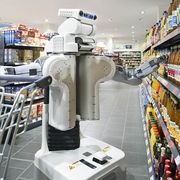Munich Researchers Compete for 1 Billion Euro Budget
19.05.2011
Robotic pilot project receives €1.5 million funding – six teams participating in competition. The development of intelligent machines with the ability to operate autonomously and to interact closely with humans is the goal of a Europe-wide robotic research project planned by a consortium of ten research institutions including the Technical University of Munich (Technische Universität München, TUM). In its first-year pilot phase, the project “Robot Companions for Citizens” (RoboCom) is being supported by the European Union with €1.5 million. Then, RoboCom will compete with five other research projects, ranging in topics from supercomputing to material science, for one of two €100 million research budgets granted yearly for ten years.

Zukunftsvision des RoboCom-Projekts: Roboter gehen einkaufen, um ältere Menschen zu unterstützen. © Astrid Eckert / TU Muenchen; Aufnahme durch Astrid Eckert
So far, robots are mainly used in well-defined environments such as industrial production or medical surgery settings. Therefore, interaction and communication with humans is also restricted to well-defined processes. The RoboCom Initiative, however, aims to develop a new generation of robots called “sentient machines” which will be able to closely collaborate and interact naturally with humans, by taking advantage of radically new design, motor and energy technologies. These abilities will enable them to care for elderly people, for example, or to act and autonomously rescue people in chaotic circumstances such as natural disasters.
Prof. Gordon Cheng, leader of the TUM group and principle investigator of the robotic research cluster Cognition for Technical Systems (CoTeSys), remarks: “After more than a year of hard work by the Consortium, we are excited to be given this chance. RoboCom will place a stronger scientific focus on the demand for robotic technologies which will cause the robotics industry to leap forward. In Munich, we are extremely well positioned to meet the challenges of this project because of our interdisciplinary research experience with CoTeSys.”
Research competitions and projects are funded within the Seventh Framework Programme for Research and Technological Development of the European Union and aim to support future and emerging technologies. All six initiatives aim to prepare their proposals for full-fledged flagship in April 2012. Two of the six pilot phases will be selected by the end of 2012. Each winner can expect a budget of €1 billion over ten years, consisting of contributions from the EU, national governments and European industrial contributors. The initiatives will involve large networks of university and industry researchers across Europe and beyond.
The Consortium “Robot Companion of Citizens” consists of:
Technische Universitaet Muenchen
Scuola Superiore Sant’Anna, Italy (Coordination)
Istitutuo Italiano di Tecnologia, Italy
Universitat Pompeu Fabra, Spain
Karlsruhe Institute of Technology, Germany
École Polytechnique Fédérale de Lausanne, Switzerland
Commisariat à l’énergie atomique et aux énergies alternatives, France
Netherlands Institute for Neurosciences, The Netherlands
University of Sheffield, United Kingdom
University of Patras, Greece
Further information:
www.robotcompanions.eu
The Cluster of Excellence CoTeSys (Cognition for Technical Systems) endeavours the question how robots perceive their environment and are able to react intelligently while executing a task. The focus is on the transfer of cognitive capabilities to technical systems. By doing this, robots can interact with people more naturally, for example a robot learns to set a breakfast table in the “cognitive kitchen” or a machine assists a human worker in the “cognitive factory” including physical closeness. CoTeSys is one of five Clusters of Excellence in which the Technische Universität München (TUM) is participating. Apart from TUM, which is also the coordinating university in CoTeSys, the other partners are: Ludwig-Maximilians-Universität, University of Armed Forces München, the German Aerospace Agency (DLR) and the Max-Planck-Institute of Neurobiology.
Kontakt:
Prof. Gordon Cheng
Institute for Cognitive Systems
Technische Universität München
Phone:+49-89-289-26800
E-Mail: gordon@tum.de
Dr. Uwe L. Haass
General Manager
Cluster of Excellence CoTeSys
Phone: +49-89-289-25723
E-Mail: uwe.haass@tum.de
Kontakt: presse@tum.de
- Dateien:
 110519_RoboCompanions_DE.pdf96 K
110519_RoboCompanions_DE.pdf96 K 110519_RoboCompanions_EN.pdf112 K
110519_RoboCompanions_EN.pdf112 K